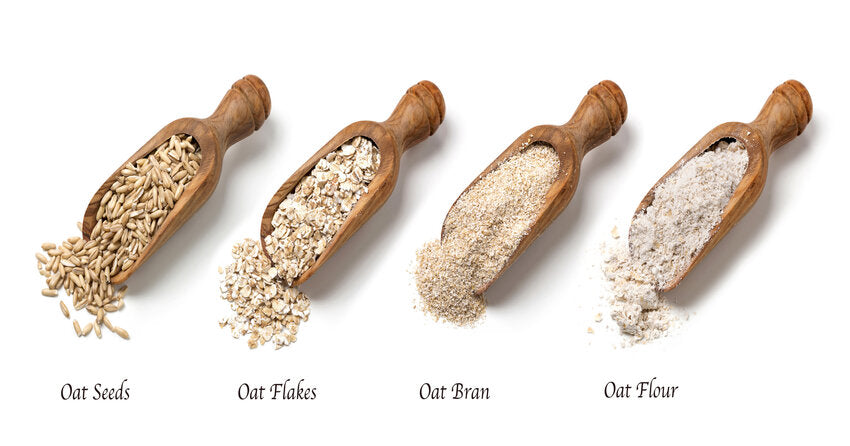Oatmeal - Good For The Body and Good For The Budget!

Who likes oatmeal? Who actually eats the stuff? Athletes, “old” people, health nuts?
Actually, I love oatmeal, and studies show that oatmeal loves me. While I must admit some would say I’m an “old” person, oatmeal is good for the young and old, the couch potato and the marathon runner, and everyone in between.
Oatmeal is a healthy breakfast option. It’s cheap, easy to fix, filling, and tasty, AND it offers a variety of health benefits.
Dr. Caldwell Esselstyn, Jr., author of Prevent and Reverse Heart Disease, eats oatmeal every day, as does his wife Ann. While Essie (as his family call him) chooses bananas or berries as toppings, Ann often enjoys savory oats.
Whether you like sweet or savory oats, they offer a plethora of benefits.
Good for the Body - The Benefits of Oatmeal
- Oats are one of the most nutrient-dense foods available. One half-cup serving of oats contains nearly twice the recommended daily intake of manganese and healthy doses (at least 10% and for some almost half of RDI) of phosphorus, magnesium, copper, iron, zinc, folate, and Vitamins B1 and B5.
- Oatmeal regulates blood sugar levels by slowing the rate at which your body breaks down carbohydrates for energy, slowing the absorption of sugar into your bloodstream.
- If you are trying to lose weight, oatmeal as a great source of fiber is a great choice. Oatmeal is also a great source of fiber (about 8 grams), which can help to keep you feeling full throughout the day. Most people who are on a diet find that it makes them feel fuller for longer periods of time than other breakfast choices.
- Oatmeal also contains soluble fiber which can help lower cholesterol and blood sugar levels. In addition, the fiber helps keep your intestinal system regular, and we know regular bowel movements are important.
- Oatmeal contains high levels of polyphenols, an antioxidant.
- Oatmeal contributes to a healthy gut.
- One cup of cooked oatmeal provides about 10 grams of protein. For those of us on a plant-based diet, oatmeal is another answer to that age-old question “where do you get your protein?”.
- One study indicates that oatmeal can reduce the risk of childhood asthma.
In a 2017 article in Today, one family attributed the secret of their long lives to oats. The Donnelly family, hailed as the Guinness World Record holders for the oldest family (combined age of 1,075 years), reported eating oats twice a day. That article also recounts the benefits of oatmeal, including lowered risk for diabetes and inflammatory conditions as well as better heart health.
A 2015 peer-reviewed research study concludes that consuming oatmeal is consistent with better nutrient intakes and a higher diet quality. This conclusion was reinforced in a 2019 study published in Nutrients:
The results show that children consuming oatmeal breakfasts have better diet quality and increased intake of key nutrients compared to breakfast skippers and other breakfast consumers and suggest oatmeal may represent an important component of a healthy childhood diet.
Which oatmeal is best?
So, we know that oatmeal is good for you, but how do you choose between the many varieties? Cooking times vary, as does the final texture. While most all oatmeal is relatively inexpensive, you will find some variety in price as well.
The quickest choice is instant oatmeal: open the packet, pour it in a cup or bowl, add water or milk, and microwave. Bam! You have oatmeal. Of course, instant is the most processed and often includes extra additives and sugar, so for those who want to steer clear of processed foods, particularly refined sugars, instant may not be the best choice. But you do you.
Last night, I made a cup of instant oats with a spoonful of peanut butter and some hemp seeds. Delicious! This weekend, I’ll choose a less processed version.
The closest to nature form of oats is whole oat groats. The hull has been removed, but the bran, endosperm, and germ remain present. Oat groats take the longest of any form to cook (30 – 45 minutes), so they may not be the best choice for the person who’s in a hurry. But when you have the time, they are wonderful – especially in savory dishes. Similar to quinoa, toasting the groats a bit before adding the cooking liquid enhances their flavor. We’ve made oat milk using oat groats.
Steel cut oats, also known as Irish oats, are groats that have been chopped into smaller pieces using a steel blade. Again, steel cut oats take a bit longer to cook (20 – 30 minutes), and they are so worth that extra time. Best made in a pot on the stove, steel cut oats are tasty, chewy and filling; they’re a great choice for weekends.
Rolled oats (old-fashioned oats) are the kind I grew up with and the kind I buy most often. They’re fairly quick to make (5-10 minutes) and are great cooked with cinnamon, apples and raisins. Rolled oats are equally delicious in cookies and cakes. I especially love them in a morning shake made with a frozen banana, a spoonful of peanut butter, a drop of chocolate syrup, and almond milk. The oats help thicken the shake, and it’s like drinking a no-bake cookie. Yum!
Quick oats are similar to rolled oats, but they’re thinner and often chopped into smaller pieces. They’re not as chewy as rolled oats, but they cook quicker (1 – 3 minutes) and are equally nutritious.
So, what's your choice? Will you have oatmeal for breakfast or maybe a snack? How about a smoothie?
Enjoy!





